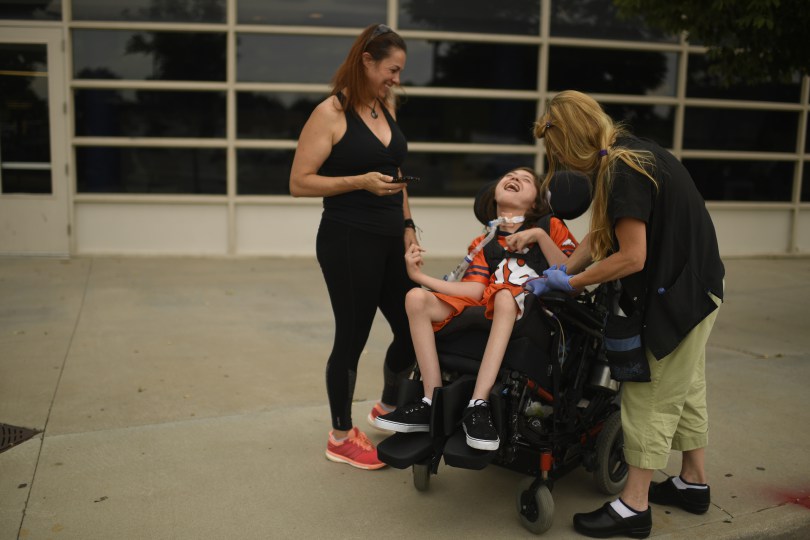Colorado school districts this year are wrestling with a new law that allows students with a valid prescription to get medical marijuana treatments on school property with or without help from a school nurse.
“Jack’s Law” offers two alternatives for the state’s 179 school districts. They can write policies limiting where on campus the treatments can take place or what forms of cannabis can be administered. If the district doesn’t create a policy, parents or a designated private caregiver would have no limitations on where they could administer the treatment.
“It’s an either/or for the school districts,” said Rep. Jonathan Singer, a Longmont Democrat who was the bill’s sponsor. He wanted the give parents the right to administer cannabis medicine while also allowing school districts a way to police its use.
“Ultimately, the school districts can figure it out,” Singer said, “or the state will figure it out for you.”
So far, some school districts — including Boulder Valley, Jefferson and Douglas County — are working on policies or have produced them.
Denver Public Schools, meanwhile, has refused to write a policy, saying marijuana use is still a violation of federal law, even for medicinal purposes.
Singer understands the districts’ reluctance to make way for medical pot for students, especially since only about 350 kids younger than 18 are currently enrolled in Colorado’s medical marijuana program.
“Marijuana is still a Class 1 controlled substance and there are some nervous folks out there that don’t want to deal with that in the classroom,” Singer said. “And school districts have a lot on their shoulders now and my guess is that most will wait on dealing with a policy or student until it’s a pressing need or issue.”

Still, the new law will help Jack Splitt, who like a lot of 15-year-olds loves the Broncos and is starting to notice girls.
Jack also has an active mind that is keen on math, even though it’s encased in a rigid, balled-up body wracked by pain that only medical marijuana can ease, says his mom, Stacey Linn.
“I know it’s so frustrating for him, he loves to socialize and wants to learn,” said Linn, who battled for two years to let Jack take his non-smokable cannabis treatments while at school. Jack, now at Wheat Ridge High School, has cerebral palsy accompanied by painful, debilitating muscle contractions.
Linn won her fight this summer when Gov. John Hickenlooper signed “Jack’s Law” on June 6. A designated caregiver — usually a parent or private caregiver — must administer the medication without creating a distraction and remove all excess medication.
The law stipulates that school district personnel are not required to administer the medication. It includes a provision that medical marijuana may not be administered on school buses or school-sponsored events that wind up on federal property or “any other location that prohibits marijuana on its property.”
“Jack’s Law” allows a school district to opt out if it can “reasonably demonstrate that it lost federal funding as a result of implementing” the policy.
As far as Denver Public Schools is concerned, however, the federal ban on marijuana is a non-starter for making a DPS policy.
“The substance is not federally approved” and the Colorado State Board of Nursing is against its administration, said DPS spokeswoman Alexandra Renteria.
Still, the district must allow a parent or designated caregiver to administer medical marijuana on school grounds, Singer said.
Schools and marijuana
No miracle-worker: It’s time to clear up some myths about pot taxes fixing all budget problems
What about the kids? This PTA mom says let’s be realistic about marijuana — legalize it (op-ed)
The funding philosophy: How are Colorado schools benefiting from recreational marijuana?
Weed news and interviews: Get podcasts of The Cannabist Show.
Subscribe to our newsletter here.
Watch The Cannabist Show.
Peruse our Cannabist-themed merchandise (T’s, hats, hoodies) at Cannabist Shop.
The Colorado Association of School Boards earlier this year warned lawmakers of the legal implications of “Jack’s Law,” said Matt Cook, the association’s director of public policy and advocacy.
“We don’t want to put any school district in a position where they are violating the law,” he said.
But the group sides with the parents and students who see the benefits of medical pot.
“We are clearly with these students,” Cook said, “and it’s not our intent to harm these kids.”
Linn saw an almost immediate change in her son’s demeanor soon after he began taking medical marijuana and cutting down on his prescribed medications. The puffiness in Jack’s face went down and he became more wide-eyed and engaged with his surroundings.
“It started a whole new world for him,” she said. “It opened up some possibilities for him.”
Linn began advocating for medical marijuana in schools when a school employee in February 2015 ripped a skin patch that was delivering cannabis-derived medicine off Jack’s arm.
“I couldn’t believe it,” she said. “Where is your compassion?”
She and other parents lobbied the state legislature. In 2015 they helped get a law passed that allowed schools to create policies permitting a student’s use of medical marijuana. But none of Colorado’s school districts created such a policy.
Linn and the parents pressed lawmakers again this year with “Jack’s Law,” which passed the state senate by a 35-0 vote and the house by a 64-1 vote.
“I think this is a game-changer,” said Linn.
